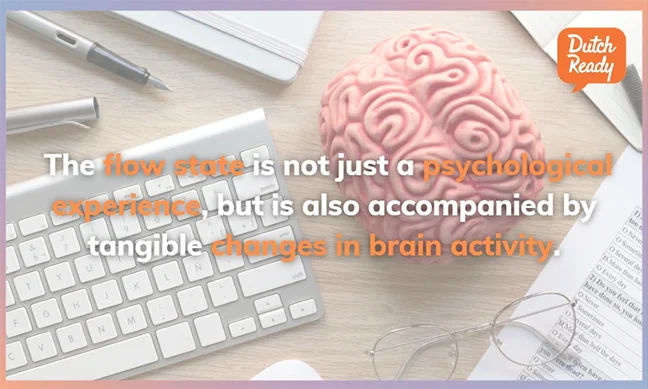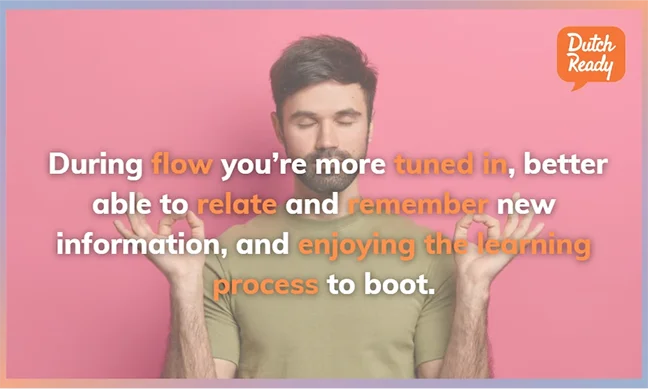Image by marymarkevichUnsplash
Finding flow in language learning
Optimal flow, also known as the “flow state,” is a state of peak performance in which an individual is fully immersed and focused on the task at hand. Research has shown that experiencing optimal flow can lead to increased productivity and motivation, as well as a deeper sense of satisfaction and enjoyment. In the realm of language learning, achieving the flow state can have significant benefits, including faster acquisition of new skills and a greater retention of information. By understanding how to enter and maintain the flow state, language learners can optimize their study sessions and ultimately improve their overall progress and success in learning a new language.
Optimal flow was first described in the 1970s by psychologist Mihaly Csikszentmihalyi. Csikszentmihalyi, a Fellow of the American Psychological Association and the American Academy of Arts and Sciences, has received numerous awards for his contributions to the field of psychology. The term optimal flow was recently brought back into the public eye with his book “Flow: The Psychology of Optimal Experience”.
Proof Flow Works
Neuroscientific research has shown that the flow state is not just a psychological experience, but is also accompanied by tangible changes in brain activity such as:
- Increased activity in the prefrontal cortex, which is responsible for focus and attention, as well as decreased activity in the default mode network, which is associated with self-related thoughts and distractions (Tang et al., 2015).
- Increased connectivity in the brain, leading to improved learning and problem solving (Jung et al., 2010).
- Increased release of dopamine and other neurotransmitters that facilitate learning and memory consolidation (Jackson & Csikszentmihalyi, 1999).
- Increased production of endorphins, which can lead to feelings of pleasure and enjoyment (Jackson et al., 2013).
In other words, during flow you’re more tuned in, better able to relate and remember new information, and enjoying the learning process to boot.

Image by Freepik
These neurophysiological changes can lead to improved learning and performance in a variety of tasks, including language learning (Nakamura & Csikszentmihalyi, 2014). For instance:
- Individuals who experienced a flow state while learning have significantly increased motivation, language performance, and language learning strategies compared to those who do not experience flow (Li, 2003).
- Flow significantly improves oral proficiency (MacIntyre, Clément, Dörnyei, & Noels, 1998).
- Flow leads to increased retention and comprehension of new vocabulary (Dunlosky & Metcalfe, 2013).
Why Does Flow Work?
So, why does optimal flow lead to improved language learning? One reason may be that it allows learners to fully engage with the material, rather than becoming distracted or disengaged. Optimal flow can also increase motivation and persistence, leading to more consistent and dedicated practice.
Additionally, the flow state triggers many chemical changes in the brain that help create connections, retain information, and recall it again later. Which means that all that extra focus and motivation has an even bigger impact.
The state is characterized by a feeling of effortless concentration and enjoyment. No wonder individuals who experience optimal flow are more likely to engage in activities for longer periods of time and to perform at their best.


Image by wayhomestudio on Freepik.
How to achive flow?
To achieve a flow state in language learning, it is important to find an activity that is engaging and challenging, but not overly difficult. Ideally, the difficulty of what you are trying to learn is just outside your comfort zone. Meaning, it is still something you struggle with, but it isn’t so new or challenging that it’s overwhelming.
Is the material too easy? You’ll likely lose interest as your progress stalls. Make it too hard, and you’ll be likely to quit in frustration. In essence, you need to find the perfect balance between ease and difficulty, comfort and discomfort.
It is also important to set specific and achievable goals for the language learning session. A clear structure and a quiet, distraction-free environment can help focus your mind and facilitate flow. It may also be helpful to have a sense of control over the learning process, as well as immediate feedback on progress. With practice and patience, it is possible to enter a flow state and greatly improve language learning abilities.
Our private language lessons are the perfect place to enter the flow state. We customize the lessons to make sure they’re always at the right level, and focus on your own personal goals. Our patient tutors help structure the process and provide you with direct feedback during your speaking or writing. Interested in trying out private lessons? You can learn more or sign up right here.
![]()
![]()
Scientific references in this article
We believe science-backed education is the future. Therefore we will always include links to the scientific research on which we base our methodology. The articles cited in this article are:
Dunlosky, J., & Metcalfe, J. (2013). Metacognition. Annual Review of Psychology, 64, 317-344.
Jackson, S. A., & Csikszentmihalyi, M. (1999). Flow in sports: The keys to optimal experiences and performances. Champaign, IL: Human Kinetics.
Jackson, S. A., Eklund, R., and Maier, M. (2013). Optimal experience in sport: A review of flow theory and its practical implications. International Review of Sport and Exercise Psychology, 6(1), 50-66.
Jung, Y., McNamara, T., & Magliano, J. (2010). Neuronal basis of flow experience during computer game play. Cyberpsychology, Behavior, and Social Networking, 13(2), 185-190.
Li, Y. (2003). The effects of flow experience on motivation and language learning outcomes. Journal of Educational Psychology, 95(4), 740-748.
MacIntyre, P. D., Clément, R., Dörnyei, Z., & Noels, K. A. (1998). Conceptualizing willingness to communicate in a L2: A situational model of L2 confidence and affiliation. Modern Language Journal, 82(4), 545-562.
Nakamura, J., & Csikszentmihalyi, M. (2014). The concept of flow. In Flow and the foundations of positive psychology (pp. 5-26). Springer Netherlands.
Tang, Y. Y., Ma, Y., Fan, Y., Feng, S., Lu, Q., Yu, Q., … Posner, M. I. (2015). Short-term meditation training improves attention and self-regulation. Proceedings of the National Academy of Sciences, 112(35), 10742-10747.
Want to learn Dutch fast? Check out our other blogs about effective language learning, like our article on how to study vocabulary effectively with spaced repetition, follow us on Instagram for mini lessons, or explore the Dutch language and culture with private Dutch lessons!











